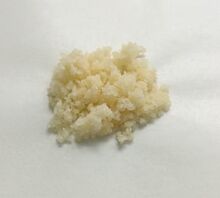Chemistry:Potassium selenocyanate

| |
| Identifiers | |
|---|---|
3D model (JSmol)
|
|
| ChemSpider | |
| EC Number |
|
PubChem CID
|
|
| |
| |
| Properties | |
| CNKSe | |
| Molar mass | 144.08 |
| Appearance | colorless or white solid |
| Density | 2.35 g/cm3 |
| high | |
Except where otherwise noted, data are given for materials in their standard state (at 25 °C [77 °F], 100 kPa). | |
| Infobox references | |
Potassium selenocyanate is the inorganic compound with the formula KSeCN. It is a hygroscopic white solid that is soluble in water, decomposing in air to red selenium and potassium cyanide. The compound has been characterized by X-ray crystallography, which confirms that it is a salt. The C-N and C-Se distances are 112 and 183 pm, respectively consistent with triple and single bonds.[1]
Synthesis and reactions
Potassium selenocyanate is produced by the reaction of molten potassium cyanide with elemental selenium.[2]
Organic selenocyanates are often prepared by treatment of potassium selenocyanate with alkyl halides or aryl diazonium salts.[2]
Potassium selenocyanate serves as a source of Se0, e.g., in its reaction with triphenylphosphine to give triphenylphosphine selenide.[3]
References
- ↑ Swank, Duane D.; Willett, Roger D. (1965). "The Crystal Structure of Potassium Selenocyanate". Inorganic Chemistry 4: 499–501. doi:10.1021/ic50026a013.
- ↑ 2.0 2.1 E. Bulka (1977). "Selenocyanates and Related Compounds". in Saul Patai. Cyanates and Their Thio Derivatives: Part 2, Volume 2. PATAI'S Chemistry of Functional Groups. p. 619-818. doi:10.1002/9780470771532.ch3.
- ↑ Nicpon, Philip; Meek, Devon W. (1967). "Triphenylphosphine Selenide". Inorganic Syntheses 10: 157–159. doi:10.1002/9780470132418.ch23.
 |

